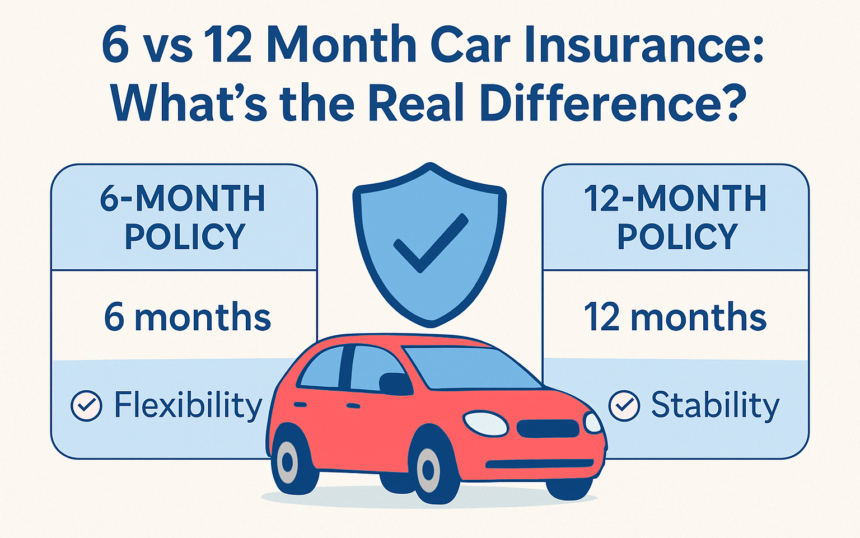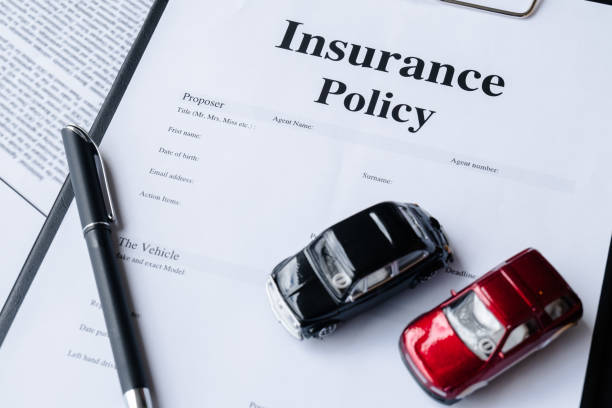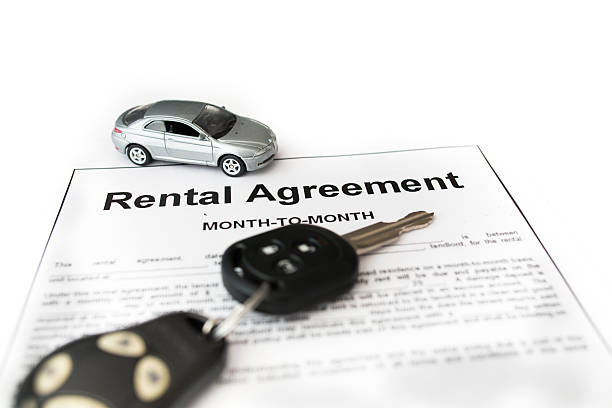
6 vs 12 Month Car Insurance What’s the Real Difference?
When it comes to choosing between a 6-month and a 12-month car insurance policy, the biggest difference lies in how often your premium can change. A 6-month policy gets reviewed twice a year, which means your rates can go up or down two times. On the other hand, a 12-month policy is evaluated just once per year, offering more stability and fewer surprises.
In this guide, you’ll explore the difference between 6 vs 12 month car insurance policies, understand their pros and cons, and learn which one suits your lifestyle better. We’ll also explain how rate changes, driving history, and flexibility play a big role in choosing the right policy.

What Are 6 vs 12 Month Car Insurance Policies?
Before we dive into choosing the best car insurance, let’s first understand what these two policies actually are. It’s like knowing the difference between a half-year and a full-year school you need to know how long it lasts and what happens during that time.
Car insurance isn’t just about paying money and driving. It’s about how long your coverage lasts, how often you need to renew it, and how it affects your money and peace of mind.
What is a 6-month car insurance policy?
A 6-month car insurance policy is a short-term plan. This means your insurance covers you for just 6 months not a full year.
Think of it like this: It’s like buying a half-year bus pass instead of a full-year one.
Here’s how it works in simple steps:
- You buy a policy that lasts for 6 months.
- After 6 months, it expires so you need to either renew it or buy a new one.
- Every time you renew, your insurance company checks everything again like your driving record, credit score, or even your ZIP code.
- If anything changes (even a small thing), your price might go up or down.
This type of policy is great if you:
- Think your driving habits might change soon,
- Are planning to switch your car,
- Or just want more freedom to shop for a better rate more often.
But remember, because it gets renewed so often, the price might change more frequently too.
What is a 12-month car insurance policy?
A 12-month car insurance policy lasts for a full year. That means once you buy it, you’re covered for 12 months straight without worrying about renewal in the middle.
Let’s say it’s like buying a whole year’s lunch box pack at once no need to go back to the store every few weeks.
Here’s what happens in this kind of policy:
- You lock in your insurance for a full 12 months.
- Your rate usually stays the same unless something big happens (like an accident).
- You don’t have to deal with renewing or re-shopping for rates twice a year.
- It gives you peace of mind and helps with budgeting since your price won’t surprise you every 6 months.
This type of policy is great if you:
- Want price stability,
- Don’t want to deal with frequent renewals,
- Or have a clean driving history and just want things to stay calm and easy.
In short:
12-month = More stable, less hassle.
6-month = More flexible, changes more often.

Key Differences Between 6 and 12 Month Policies
Now that you understand what each policy is, let’s compare them side-by-side. This will help you clearly see the pros and cons of both. Like comparing two flavors of ice cream both are good, but one might suit your taste better.
We’ll look at two big things: how your prices and flexibility are affected.
Premium stability and rate changes
This is about how often your insurance price (premium) can go up or down.
With a 6-month policy:
- Your insurance gets reviewed every 6 months.
- That means the price can change twice a year.
- Even small things like a speeding ticket or moving to a new place can affect your rate quickly.
- It’s less predictable.
With a 12-month policy:
- Your rate is usually locked for the whole year.
- You don’t have to worry about price surprises every few months.
- It gives you peace of mind especially if you have a good driving record.
So if you like to keep things calm and steady, 12-month wins in this area.
But if you think your driving is improving and you want your rates to reflect that sooner, 6-month might work better.
Flexibility and policy updates
Now let’s talk about how easy it is to change or update your policy.
6-month policy:
- More chances to switch providers or shop for better deals.
- If your life situation changes (like moving, buying a new car), it’s easier to adjust.
- You get more frequent reviews, which can work in your favor if you’re improving your driving habits.
12-month policy:
- Feels a bit more “locked in.”
- Changing providers in the middle of the year might lead to cancellation fees or complications.
- Good if you like to “set it and forget it.”
So:
- If you like control and options → Go with 6-month.
- If you want less paperwork and fewer changes → Go with 12-month.

Which One Is Better For You?
Okay, now that you know what both 6-month and 12-month car insurance policies are, and how they’re different, it’s time to ask the big question:
“Which one should I choose?”
Well, the answer depends on your life, your car, your plans, and how comfortable you are with change. Let’s look at both options in real-life situations.
When a 6-month policy makes more sense
Imagine someone who changes their car often maybe they love trying out new models or lease cars every few months. For this kind of person, a 6-month policy is like a perfect match. Why? Because it gives them more room to breathe. They can switch cars or insurance companies without feeling stuck for a whole year.
Also, if your life is a bit unpredictable like maybe you’re moving to another state soon, or you’re unsure about your job going for a 6-month policy can keep things flexible. It’s kind of like wearing shoes with laces instead of tight boots. You can adjust whenever needed.
Another great reason? If you’re working on improving your credit score or driving record, the shorter term lets you re-check your rates sooner. So if you’ve been a better driver lately, you might get a better price faster.
Bottom line:
If change is your thing, 6-month might be your friend.
When a 12-month policy is the smarter choice
On the other hand, if your life is more settled like you have a stable job, you plan to keep your car for a while, and you don’t want surprises every few months then a 12-month policy could be a better fit.
Let’s say you budget your expenses carefully and hate unexpected price hikes. A 12-month policy means you lock in your rate for the whole year. That means no sudden price jumps for 12 months, even if insurance rates go up in the market.
Also, if you just want to “set it and forget it,” this is your kind of plan. You don’t have to worry about renewing or reviewing your policy every few months. It’s peaceful, easy, and predictable.
Bottom line:
If you love stability and long-term planning, go for the 12-month option.

Things to Consider Before Choosing a Policy
You’re almost there ready to make a smart choice. But before you decide, there are a couple of things you should think about. These aren’t tricky just little reminders that can make a big difference.
How often rates change with each policy type
Let’s talk about something most people forget: how often insurance rates can change.
When you choose a 6-month policy, you’re basically agreeing to re-check and re-price your insurance every six months. That means your insurance company will look at your driving habits, your address, your credit score, and even things like local accident trends twice a year.
So if something changes (even just a little), your premium might jump up or drop down. That sounds okay if you’re ready for it, but it also means you don’t get long-term price protection.
With a 12-month policy, things are calmer. The company still watches things in the background, but your price is locked in for a year. That means fewer changes, fewer surprises, and fewer emails about “Your policy is ending soon.”
So if you don’t like playing the price game twice a year, the 12-month plan is like a cozy blanket of stability.
How your driving record affects both policies
Your driving record is like your school report card it tells the insurance company how safe and responsible you are.
If your record is clean no accidents, no tickets you’re in a sweet spot. Insurance companies love safe drivers. And here’s the cool part:
With a 6-month policy, your safe record can help lower your rate sooner. You don’t have to wait a whole year to prove yourself you get a second chance to earn discounts in just 6 months.
But here’s the flip side: if you make a mistake like getting a speeding ticket it can also hurt your rate faster. So with a 6-month policy, both good and bad things show up in your price sooner.
With a 12-month policy, changes take longer to show up. That means if you’ve been good, you’ll wait longer to see rewards. But if something bad happens, your rate won’t increase until the renewal next year so you get some cushion time.
So ask yourself:
- Are you confident in your driving for the next year?
- Do you want quick rewards or slow and steady peace?
Conclusion
In conclusion, choosing between a 6-month or 12-month car insurance policy depends on what fits your needs. If you want flexibility, go for 6 months. For stability and long-term peace of mind, the 12-month policy is the way to go. Weigh your options carefully and pick the plan that suits your budget and driving habits best.


